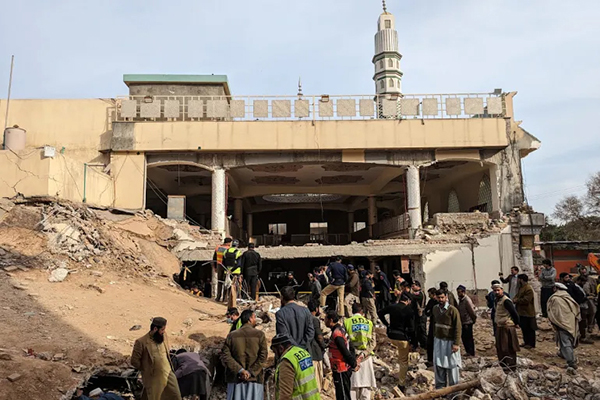Pakistan military establishment’s known policy of using terrorism as a tool of its neighborhood strategy is backfiring and worsening the security situation within Pakistan. On January 30, a suicide bomber targeted a mosque in Peshawar, killing over 90 people, mostly police personnel.
The Tehrik-i-Taliban Pakistan (TTP) has reportedly disassociated itself from the attack; however, an affiliated faction accepted the bombing and called it the revenge for the TTP commander Omar Khalid Khorasani’s mysterious killing in Afghanistan last year, according to Pakistani media reports.
Since the Taliban takeover of Afghanistan in August 2021, Islamist terror groups, especially TTP, have increased violence in Pakistan. Importantly, the Army establishment in Pakistan negotiated with TTP for over a year, with no positive results.
Consequently, the terror group is targeting Pakistan’s security forces with impunity and is in no mood to restart the peace negotiations anytime soon.
The recent spike in terror attacks is a major failure of Pakistan’s powerful military establishment. While the political leadership in Pakistan is facing criticism from different quarters, the security establishment should be blamed for the recent security turmoil in the country. The civilian government was not even included in peace negotiations with TTP and therefore had limited information on the outcome(s) of the dialogue, according to a report in Pakistan Tribune.
It is reported that former Director General Inter-Services Intelligence (ISI) Lieutenant General (Retd) Faiz Hameed single-handedly led negotiations with TTP and had possibly compromised on certain controversial demands of the terror group, according to Pak media reports
Therefore, it is not surprising that TTP felt emboldened and acted aggressively after its core demands were not ‘officially’ accepted by the Pakistan government. The security situation has worsened since General Asim Munir took over the charge as Pakistan’s new Chief of Army Staff (COAS) on November 29. Interestingly, TTP official announced the ending of a months-long ceasefire with the Pakistan government on November 28, expecting a hawkish policy from the new Army chief.
The terror group is mostly targeting security forces in the erstwhile Federally Administered Tribal Areas (FATA) and other parts of Khyber Pakhtunkhwa (KPK) province. According to the annual report of Centre for Research and Security Studies (CRSS), Pakistan witnessed as many as 376 terror attacks in 2022 and KP province experienced an exponential rise in violence whereby “the fatalities there went up by 108 per cent.”
Islamabad promised stability in the tribal areas after the Taliban’s takeover of Afghanistan. On the contrary, Pashtun areas are among the worst hit by the ‘new’ wave of militancy in Pakistan.
While TTP is largely operating in KPK province and Balochistan, it has conducted few attacks in Islamabad and Punjab as well in the last one year. On December 23, TTP militants detonated a car bomb in Pakistan’s capital, killing a police officer and injuring several others. Worryingly for the security establishment, there is a spike in TTP-led suicide attacks in Pakistan.
The recent Peshawar Mosque bombing was also a suicide attack. Reports suggest that the bomber was standing in the front row at the time of the explosion. The mosque is located inside a ‘highly fortified’ compound in Peshawar that included the headquarters of KPK police force and the Counter-Terrorism Department (CTD) offices. Last month, TTP militants seized a CTD police station in KPK’s Bannu district and took hostages to negotiate with the government authorities.
Prime Minister Shehbaz Sharif and General Syed Asim Munir visited Peshawar following the suicide bombing and reportedly held a meeting to discuss the law-and-order situation in KPK. Sharif stated that the capacity of the country’s anti-terrorism institutions and police would be enhanced and National Action Plan (NAP) would be “implemented comprehensively and with full force”.
Imran Khan also condemned the attack in a tweet: “It is imperative we improve our intelligence gathering & properly equip our police forces to combat the growing threat of terrorism.” Khan’s known ‘soft approach’ on the TTP issue and the PTI government’s lackadaisical attitude have been criticised for the deteriorating situation in KPK province.
Peshawar attack was the deadliest terrorist act since a suicide bombing at a Shia Mosque in Koocha Risaldar area during Friday prayers in March 2022, resulting in 58 deaths and 200 injuries. The investigation had revealed that the attacker was an ‘Afghan exile’ who trained with the Islamic State (IS) before carrying out the attack.
Frequent attacks target law enforcement agencies, but the recent Police Lines bombing is seen as a major escalation. Some analysts are predicting a new military operation against TTP after this attack as the political leadership, security establishment, and even the opposition leaders have failed to control the scourge of militancy in Pakistan.
Politically, Pakistan is completely paralyzed as the Pakistan Democratic Movement (PDM) alliance government and Imran Khan’s Pakistan Tehreek-i-Insaf (PTI) are indulged in a ruthless battle to rule Islamabad. It is believed that the weakened economy and the persistent political instability present an opportunity for TTP and similar groups to increase pressure on the Pakistani state to fulfill their key demands. More importantly, Islamabad cannot continue to pressure the Afghan Taliban on TTP until its own house is not in order.


















